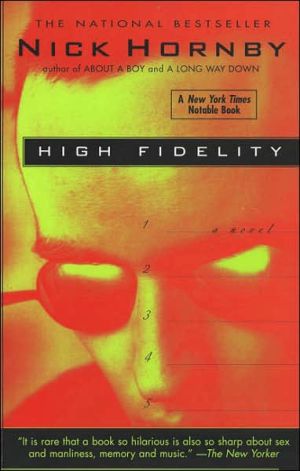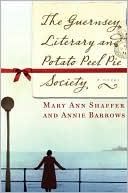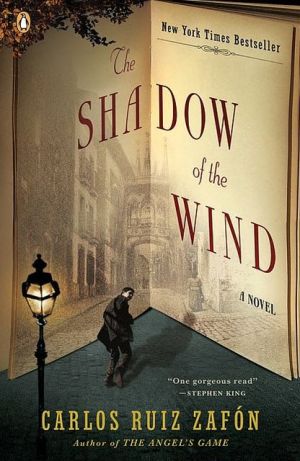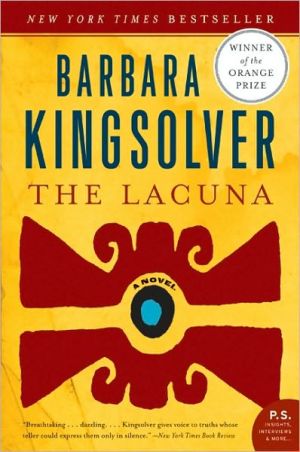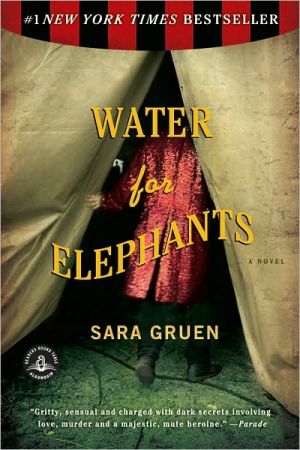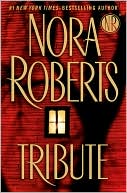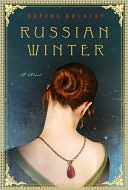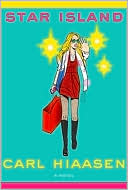High Fidelity
Now a major motion picture from Touchstone Pictures.\ Rob is a pop music junkie who runs his own semi-failing record store. His girlfriend, Laura, has just left him for the guy upstairs, and Rob is both miserable and relieved. After all, could he have spent his life with someone who has a bad record collection? Rob seeks refuge in the company of the offbeat clerks at his store, who endlessly review their top five films (Reservoir Dogs...); top five Elvis Costello songs ("Alison"...); top five...
Search in google:
High Fidelity is the story of Rob, a pop music junkie who runs his own semi-failing record store. His girlfriend Laura has just left him for Ian from the flat upstairs. Rob is both miserable and relieved. After all, could he have spent his life with someone who has a bad record collection? This narrowly misses his list of all-time top five most memorable split-ups. Rob seeks refuge in the company of Barry and Dick, the offbeat clerks at his store. They speak the masculine language of lists, endlessly reviewing their top five films (Reservoir Dogs...); top five Elvis Costello songs ("Alison"...); top five episodes of Cheers (the one where Woody sang his stupid song to Kelly...). Rob tries dating a singer called Marie (a post-Partridge Family, pre-L.A. Law Susan Dey), who once sold a song to Nanci Griffith. Her rendition of "Baby, I Love Your Way" makes him cry. But maybe it's just that he's always wanted to sleep with someone who has a record contract. Then he sees Laura again. And Rob begins to think (as awful as it sounds) that life as an episode of thirtysomething, with all the kids and marriages and jobs and barbecues and k.d. lang CDs that this implies, might not be so bad.BUST MagazineReading this book is like reading an owner's manual for men....It's a quick, snicker-out-loud-then-nod-knowingly read. Then leave it around so your boyfriend picks it up. Tell him it's about music.
Chapter One \ Now... Laura leaves first thing Monday morning with a hold-all and a carrier bag. It's sobering, really, to see how little she is taking with her, this woman who loves her things, her teapots and her books and her prints and the little sculpture she bought in India: I look at the bag and think, Jesus, this is how much she doesn't want to live with me. \ We hug at the front door, and she's crying a little. \ "I don't really know what I'm doing," she says. \ "I can see that," I say, which is sort of a joke and sort of not. "You don't have to go now. You can stay until whenever." \ "Thanks. But we've done the hard part now. I might as well, you know . . ." \ "Well, stay for tonight, then." \ But she just grimaces, and reaches for the door handle. \ It's a clumsy exit. She hasn't got a free hand, but she tries to open the door anyway and can't, so I do it for her, but I'm in the way, so I have to go through on to the landing to let her out, and she has to prop the door open because I haven't got a key, and I have to squeeze back past her to catch the door before it shuts behind her. And that's it. \ I regret to say that this great feeling, part liberation and part nervous excitement, enters me somewhere around my toes and sweeps through me in a great wave. I have felt this before, and I know it doesn't mean that much-confusingly, for example, it doesn't mean that I'm going to feel ecstatically happy for the next few weeks. But I do know that I should work with it, enjoy it while it lasts. \ This is how I commemorate my return to the Kingdom of the Single: I sit down in my chair, the one that will stay here with me, and pick bits of the stuffing out of the arm; I light a cigarette, even though it is still early and I don't really feel like one, simply because I am now free to smoke in the flat whenever I want, without rows; I wonder whether I have already met the next person I will sleep with, or whether it will be someone currently unknown to me; I wonder what she looks like, and whether we'll do it here, or at her place, and what that place will be like; I decide to have a Chess Records logo painted on the sitting room wall. (There was a shop in Camden that had them all-Chess, Stax, Motown, Trojan-stenciled onto thebrickwork beside the entrance, and it looked brilliant. Maybe I could get hold of the guy who did that and ask him to do smaller versions here.) I feel OK. I feel good. I go to work. \ My shop is called Championship Vinyl. I sell punk, blues, soul, and R&B, a bit of ska, some indie stuff, some sixties pop-everything for the serious record collector, as the ironically old-fashioned writing in the window says. We're in a quiet street in Holloway, carefully placed to attract the bare minimum of window-shoppers; there's no reason to come here at all, unless you live here, and the people that live here don't seem terribly interested in my Stiff Little Fingers white label (twenty-five quid to you-I paid seventeen for it in 1986) or my mono copy of Blonde on Blonde. \ I get by because of the people who make a special effort to shop here Saturdays-young men, always young men, with John Lennon specs and leather jackets and armfuls of square carrier bags-and because of the mail order: I advertise in the back of the glossy rock magazines, and get letters from young men, always young men, in Manchester and Glasgow and Ottowa, young men who seem to spend a disproportionate amount of their time looking for deleted Smiths singles and "ORIGINAL NOT RERELEASED" underlined Frank Zappa albums. They're as close to being mad as makes no difference. \ I'm late to work, and when I get there Dick is already leaning against the door reading a book. He's thirty-one years old, with long, greasy black hair; he's wearing a Sonic Youth T-shirt, a black leather jacket that is trying manfully to suggest that it has seen better days, even though he only bought it a year ago, and a Walkman with a pair of ludicrously large headphones which obscure not only his ears but half his face. The book is a paperback biography of Lou Reed. The carrier bag by his feet-which really has seen better days-advertises a violently fashionable American independent record label; he went to a great deal of trouble to get hold of it, and he gets very nervous when we go anywhere near it. He uses it to carry tapes around; he has heard most of the music in the shop, and would rather bring new stuff to work-tapes from friends, bootlegs he has ordered through the post-than waste his time listening to anything for a second time. ("Want to come to the pub for lunch, Dick?" Barry or I ask him a couple of times a week. He looks mournfully at his little stack of cassettes and sighs. "I'd love to, but I've got all these to get through.") \ "Good morning, Richard." \ He fumbles nervously with the giant headphones, gets one side stuck around his ear, and the other side falls over one eye. \ "Oh, hi. Hi, Rob." \ "Sorry I'm late." \ "No, no problem." \ "Good weekend?" \ I unlock the shop as he scrabbles around for his stuff. \ "All right, yeah, OK. I found the first Liquorice Comfits album in Camden. The one on Testament of Youth. It was never released here. Japanese import only." \ "Great." I don't know what the fuck he's talking about. \ "I'll tape it for you." \ "Thanks." \ "'Cos you liked their second one, you said. Pop, girls, etc. The one with Hattie Jacques on the cover. You didn't see the cover, though. You just had the tape I did for you." \ I'm sure he did tape a Liquorice Comfits album for me, and I'm sure I said I liked it, too. My flat is full of tapes Dick has made me, most of which I've never played. \ "How about you, anyway? Your weekend? Any good? No good?" \ I cannot imagine what kind of conversation we'd have if I were to tell Dick about my weekend. He'd probably just crumble to dust if I explained that Laura had left. Dick's not big on that sort of thing; in fact, if I were ever to confess anything of a remotely personal nature-that I had a mother and father, say, or that I'd been to school when I was younger-I reckon he'd just blush, and stammer, and ask if I'd heard the new Lemonheads album. \ "Somewhere in between. Good bits and bad bits." \ He nods. This is obviously the right answer. \ The shop smells of stale smoke, damp, and plastic dustcovers, and it's narrow and dingy and dirty and overcrowded, partly because that's what I wanted-this is what record shops should look like, and only Phil Collins's fans bother with those that look as clean and wholesome as a suburban Habitat-and partly because I can't get it together to clean or redecorate it. \ There are browser racks on each side, and a couple more in the window, and CDs and cassettes on the walls in glass cases, and that's more or less the size of it; it's just about big enough, provided we don't get any customers, so most days it's just about big enough. The stockroom at the back is bigger than the shop part in the front, but we have no stock, really, just a few piles of secondhand records that nobody can be bothered to price up, so the stockroom is mostly for messing about in. I'm sick of the sight of the place, to be honest. Some days I'm afraid I'll go berserk, rip the Elvis Costello mobile down from the ceiling, throw the "Country Artists (Male) A-K" rack out into the street, go off to work in a Virgin Megastore, and never come back. \ Dick puts a record on, some West Coast psychedelic thing, and makes us some coffee while I go through the post; and then we drink the coffee; and then he tries to stuff some records into the bulging, creaking browser racks while I parcel up a couple of mail orders; and then I have a look at the Guardian quick crossword while he reads some American import rock magazine; then he has a look at the Guardian quick crossword while I read the American import magazine; and before we know it, it's my turn to make the coffee. \ At about half-past eleven, an Irish drunk called Johnny stumbles in. He comes to see us about three times a week, and his visits have become choreographed and scripted routines that neither he nor I would want to change. In a hostile and unpredictable world, we rely on each other to provide something to count on. \ "Fuck off, Johnny," I tell him. \ "So my money's no good to you?" he says. \ "You haven't got any money. And we haven't got anything that you want to buy." \ This is his cue to launch into an enthusiastic rendition of Dana's "All Kinds of Everything," which is my cue to come out from behind the counter and lead him back toward the door, which is his cue to hurl himself at one of the browser racks, which is my cue to open the door with one hand, loosen his grip on the rack with the other, and push him out. We devised these moves a couple of years ago, so we've got them off pat now. \ Johnny is our only prelunch customer. This isn't a job for the wildly ambitious. Barry doesn't show up until after lunch, which isn't unusual. Both Dick and Barry were employed to work part-time, three days each, but shortly after I'd taken them on they both started turning up every day, including Saturdays. I didn't know what to do about it-if they really had nowhere else to go and nothing else to do, I didn't want to, you know, draw attention to it, in case it prompted some sort of spiritual crisis-so I upped their money a bit and left it at that. Barry interpreted the pay rise as a signal to cut his hours back, so I haven't given him one since. That was four years ago, and he's never said anything about it. \ He comes into the shop humming a Clash riff. Actually, "humming" is the wrong word: he's making that guitar noise that all little boys make, the one where you stick your lips out, clench your teeth and go "DA-DA!" Barry is thirty-three years old. \ "Awlright boys? Hey, Dick, what's this music, man? It stinks." He makes a face and holds his nose. "Phwooar." \ Barry intimidates Dick, to the extent that Dick rarely says a word when Barry is in the shop. I only get involved when Barry is being really offensive, so I just watch Dick reach for the hi-fi on the shelf above the counter and turn the cassette off. \ "Thank fuck for that. You're like a child, Dick. You need watching all the time. I don't know why I should have to do it all, though. Rob, didn't you notice what he was putting on? What are you playing at, man?" \ He talks relentlessly, and more or less everything he says is gibberish. He talks a lot about music, but also a lot about books (Terry Pratchett and anything else which features monsters, planets, and so on), and films, and women. Pop, girls, etc., as the Liquorice Comfits said. But his conversation is simply enumeration: if he has seen a good film, he will not describe the plot, or how it made him feel, but where it ranks in his best-of-year list, his best-of-all-time list, his best-of-decade list-he thinks and talks in tens and fives, and as a consequence, Dick and I do too. And he makes us write lists as well, all the time: "OK, guys. Top five Dustin Hoffman films." Or guitar solos, or records made by blind musicians, or Gerry and Sylvia Anderson shows ("I don't believe you've got Captain Scarlet at number one, Dick. The guy was immortal! What's fun about that?"), or sweets that come in jars ("If either of you have got Rhubarb and Custard in the top five, I'm resigning now."). \ Barry puts his hand into his leather jacket pocket, produces a tape, puts it in the machine, and jacks up the volume. Within seconds the shop is shaking to the bass line of "Walking on Sunshine," by Katrina and the Waves. It's February. It's cold. It's wet. Laura has gone. I don't want to hear "Walking on Sunshine." Somehow it doesn't fit my mood. \ "Turn it off, Barry." I have to shout, like a lifeboat captain in a gale. \ "It won't go up any more." \ "I didn't say 'up,' you fuckwit. I said 'off."' \ He laughs, and walks through into the stockroom, shouting out the horn parts: "Da DA! da da da da da-da da-da-da-da." I turn it off myself, and Barry comes back into the shop. \ "What are you doing?" \ "I don't want to hear 'Walking on Sunshine'!" \ "That's my new tape. My Monday morning tape. I made it last night, specially." \ "Yeah, well, it's fucking Monday afternoon. You should get out of bed earlier." \ "And you'd have let me play it this morning, would you?" \ "No. But at least this way I've got an excuse." \ "Don't you want something to cheer you up? Bring a bit of warmth to your miserable middle-aged bones?" \ "Nope." \ "What do you want to hear when you're pissed off then?" \ "I don't know. Not 'Walking on Sunshine,' for a start." \ "OK, I'll wind it on." \ "What's next?" \ "'Little Latin Lupe Lu."' \ I groan. \ "Mitch Ryder and the Detroit Wheels?" Dick asks. \ "No. The Righteous Brothers." You can hear the defensiveness in Barry's voice. He has obviously never heard the Mitch Ryder version. \ "Oh. Oh well. Never mind." Dick would never go so far as to tell Barry that he's messed up, but the implication is clear. \ "What?" says Barry, bristling. \ "Nothing." \ "No, come on. What's wrong with the Righteous Brothers?" \ "Nothing. I just prefer the other one," says Dick mildly. \ "Bollocks." \ "How can it be bollocks to state a preference?" I ask. \ "If it's the wrong preference, it's bollocks." \ Dick shrugs and smiles. \ "What? What? What's that smug smile for?" \ "Leave him alone, Barry. It doesn't matter. We're not listening to fucking 'Little Latin Lupe Lu' anyway, so give it a rest." \ "Since when did this shop become a fascist regime?" \ "Since you brought that terrible tape in." \ "All I'm trying to do is cheer us up. That's all. Very sorry. Go and put some old sad bastard music on, see if I care." \ "I don't want old sad bastard music on either. I just want something I can ignore." \ "Great. That's the fun thing about working in a record shop, isn't it? Playing things that you don't want to listen to. I thought this tape was going to be, you know, a talking point. I was going to ask you for your top five records to play on a wet Monday morning and all that, and you've gone and ruined it." \ "We'll do it next Monday." \ "What's the point of that?" \ And so on, and on, probably for the rest of my working life. \ I'd like to do a top five records that make you feel nothing at all; that way, Dick and Barry would be doing me a favor. Me, I'll be playing the Beatles when I get home. Abbey Road, probably, although I'll program the CD to skip over "Something." The Beatles were bubblegum cards and Help at the Saturday morning cinema and toy plastic guitars and singing "Yellow Submarine" at the top of my voice in the back row of the coach on school trips. They belong to me, not to me and Laura, or me and Charlie, or me and Alison Ashworth, and though they'll make me feel something, they won't make me feel anything bad. \ Reprinted from High Fidelity by Nick Hornby by permission of Riverhead Books, a member of Penguin Putnam Inc. Copyright (c) 2000 by Nick Hornby. All rights reserved. This excerpt, or any parts thereof, may not be reproduced in any form without permission.
\ BUST MagazineReading this book is like reading an owner's manual for men....It's a quick, snicker-out-loud-then-nod-knowingly read. Then leave it around so your boyfriend picks it up. Tell him it's about music.\ \ \ \ \ Mark JollyWith only a slim memoir and a novel to his name, Nick Hornby seems to have surveyed the panorama of painful verities attached to growing up with love, soccer and pop music in one's heart. High Fidelity fills you with the same sensation you get from hearing a debut record album that has more charm and verve and depth than anything you can recall. The goods have been delivered and already you begin to wonder about that "difficult" second album.\ — New York Times\ \ \ Publishers Weekly\ - Publisher's Weekly\ British journalist Hornby has fashioned a disarming, rueful and sometimes quite funny first novel that is not quite as hip as it wishes to be. The book dramatizes the romantic struggle of Rob Fleming, owner of a vintage record store in London. After his girlfriend, Laura, leaves him for another man, he realizes that he pines not for sexual ecstasy epitomized by a "bonkus mirabilis'' in his past but for the monogamy this cynic has come to think of as a crime. He takes comfort in the company of the clerks at the store, whose bantering compilations of top-five lists e.g., top five Elvis Costello songs; top-five films typify the novel's ingratiating saturation in pop culture. Sometimes this can pall: readers may find that Rob's ruminations about listening to the Smiths and the Lemonheads-pop music helps him fall in love, he tells us-are more interesting than his list of five favorite episodes of Cheers. Rob takes comfort as well in the company of a touring singer, Marie La Salle, who is unpretentious and "pretty in that nearly cross-eyed American way''-but life becomes more complicated when he encounters Laura again.\ \ \ \ \ Library JournalRob Fleming is the kind of person whose mindset is clearly shown by his top two career choices: journalist for the New Musical Express, 1976-79, and producer for Atlantic Records, circa 1964-71. Owner of a small London record shop and musical snob of a high degree, Rob finds his life thrown into turmoil when live-in girlfriend Laura suddenly leaves. He embarks on a journey through the past, tracking down old lovers while finding solace with Marie, an American folk/country singer living in London, even as he yearns for Laura's return. Told in an engaging first-person voice that blends sarcasm with self-deprecating humor, High Fidelity presents a painfully funny take on love, music, and growing up. -Lawrence Rungren, Bedford Free P.L., Mass.\ \
